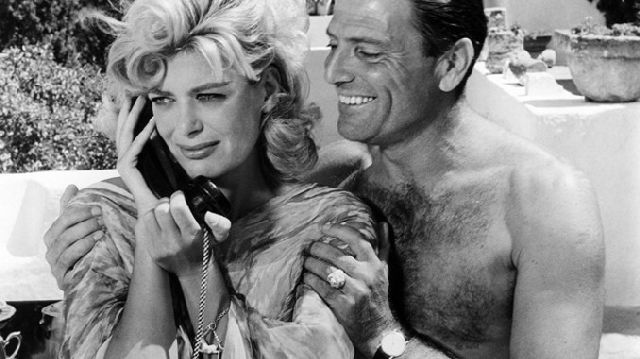Phaedra (1962) 
“A violent drama of profane love”

Director: Jules Dassin
Cast: Melina Mercouri, Anthony Perkins, Raf Vallone
Synopsis: A retelling of the Greek myth of Phaedra. In modern Greece, Alexis’s father, an extremely wealthy shipping magnate, marries the younger, fiery Phaedra.
Funny how 1960s filmmakers who updated history or mythology to modern dress equated ancient Gods or men of power with modern-day shipping magnates. A little while ago I watched a little known British film called An Honourable Murder (1960) in which the betrayal of Caesar was played out in the boardroom of a shipping company, and today I watched the Greek legend of Hippolytus portrayed in much the same way in Jules Dassin’s ambitious, if flawed, Phaedra. For those of you not up to speed on Greek mythology, Hippolytus, the son of Theseus, spurned the advances of his step-mother Phaedra, who subsequently convinced her husband that his son had raped her. In retribution, Theseus cursed his son, who died when the horses pulling his chariot were spooked by a wild bull.
Melina Mercouri, director Jules Dassin’s wife, plays the eponymous anti-heroine, the neglected wife of shipping magnate Thanos (played by Raf Vallone, and probably based on Greek shipping tycoon Aristotle Onassis). Although he loves his wife, Thanos constantly jets around the globe on business, and is so pre-occupied with work that he sends his wife to bring back his son, Alexis (Anthony Perkins), who is indulging in artistic pursuits in London instead of studying Economics. Phaedra duly does so, and she is immediately attracted to her step-son. It’s a feeling that is clearly reciprocated, and they embark on a brief but passionate affair which Phaedra eventually brings to a halt. However, back in Greece, she changes her mind and proceeds to pursue her now reluctant step-son with tragic consequences.
It’s a story replete with risks, not least of which is a descent into over-emotive melodrama, and to be fair Dassin is occasionally guilty of allowing the principal members of his cast to overact (particularly Perkins in his final scenes). Most at risk is Mercouri, in a role that calls upon her to portray a range of emotions, but although her casting – and disproportionate number of close-ups – smack of nepotism, she gives the best performance. It’s as difficult to believe she would opt for gangling, inexperienced Alexis over her powerful, gregarious husband, though, as it is to believe she possesses the kind of beauty that would turn all men’s heads. She looks a little like Joan Crawford at times, but exudes an earthy sexuality that seems peculiar to European women (Anna Magnani is another example).
When Dassin isn’t focusing his camera on his wife, he fills the screen with references to – or symbols of – the Greek mythology from which his tale is plucked. At least three times we see him rising into the sky like a God, twice on his own helicopter and once, most strikingly, when he and Alexis stand on a platform raised by a crane that overlooks the hub of his shipping empire. The world is imprinted on the doors of Thanos’s office, waiting to be conquered. This blending of the modern age and the old world help to keep the viewer interested in a tale that, without these resonances, might otherwise have resembled nothing more than a glossy soap opera, and which too often indulges in arty pretension.
(Reviewed 14th March 2012)
httpv://www.youtube.com/watch?v=vB4kmEZaOQ4
